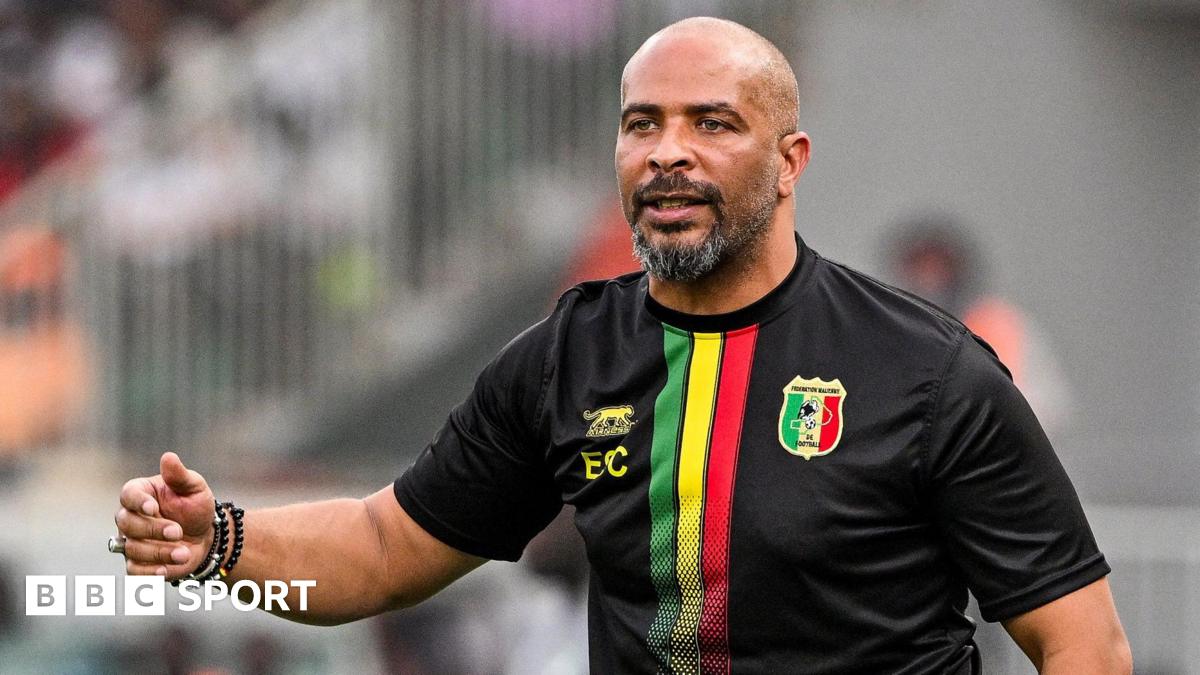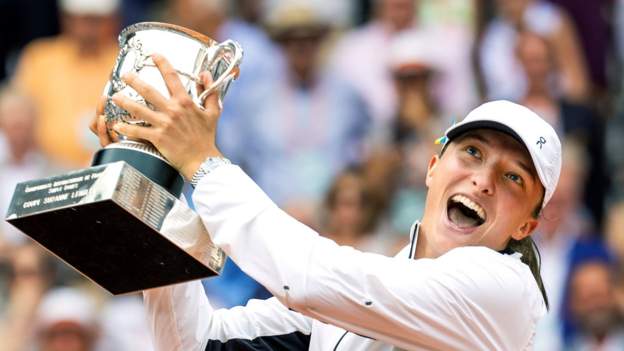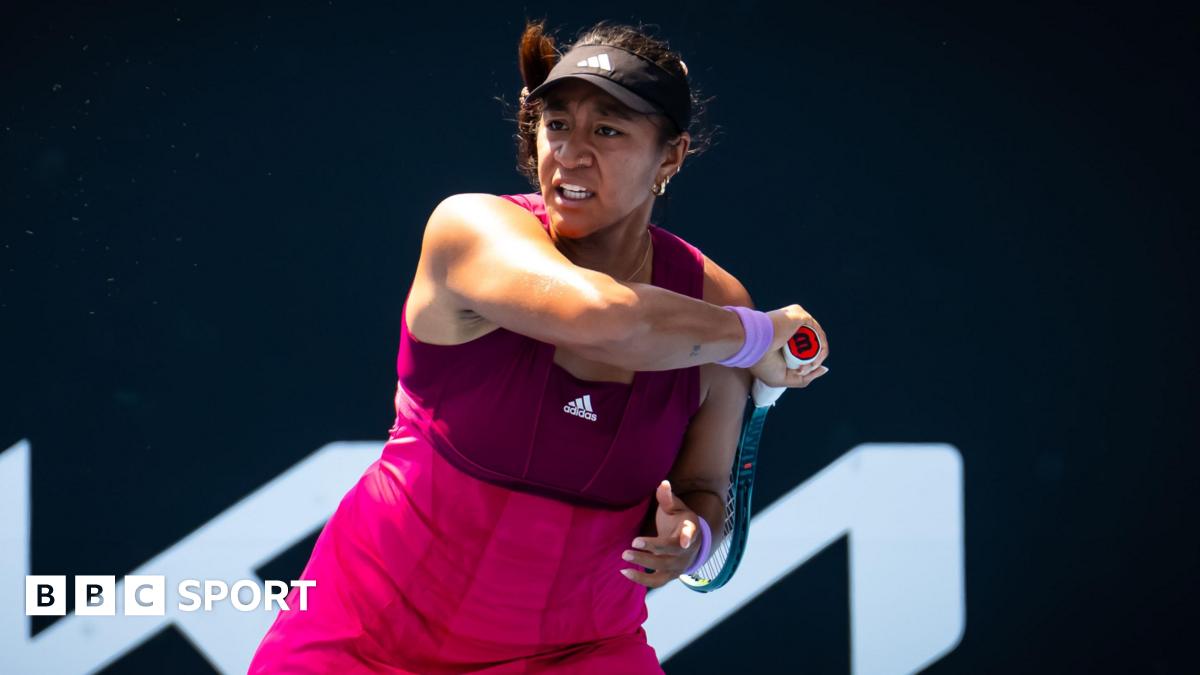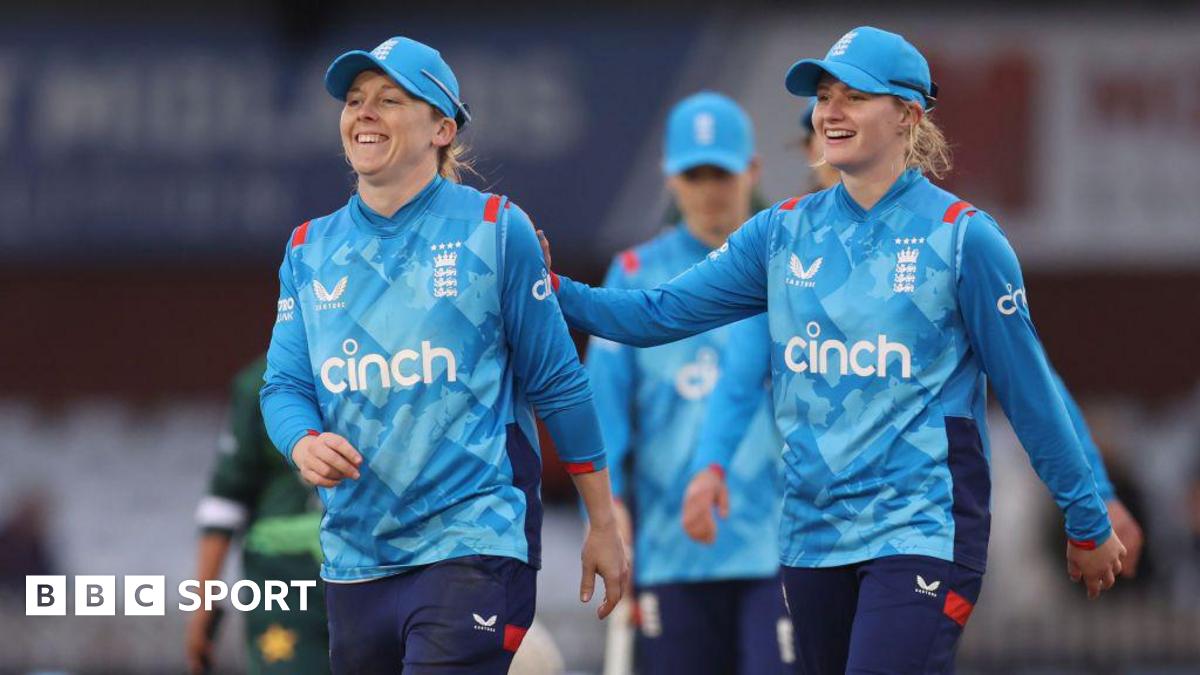| Venue: Roland Garros, Paris Dates: 28 May-11 June |
| Coverage: Live text and radio commentaries of selected matches across BBC Radio 5 Sports Extra, the BBC Sport website and app |
Iga Swiatek maintained her recent grip on the French Open by fighting past Karolina Muchova to win her third Roland Garros title in four years.
The top seed was the heavy favourite to beat 43rd-ranked Muchova, but had to dig deep to win 6-2 5-7 6-4.
Czech player Muchova, 26, broke for 4-3 in the decider, but Poland’s Swiatek, 22, finished strongly to triumph.
Swiatek, who has now won four Grand Slams, is the first woman to defend the title since Justine Henin in 2007.
“It wasn’t an easy match. It was a pretty intense last few weeks,” said world number one Swiatek, who dropped the lid off the Coupe Suzanne Lenglen seconds after collecting the trophy.
“I am just really happy. I never really focus on the records. I just do my best every day.”
Muchova – told to quit last year by doctors because of injuries – showed remarkable resolve to fight back from a set and 3-0 down, not only making a contest of what had been a one-sided match but moving to within two service holds of a first major title.
However, after immediately being unable to back up the break as Swiatek levelled for 4-4, Muchova ended up losing in one of the cruellest possible ways by producing a double fault on her opponent’s first match point.
Swiatek instantly dropped her racquet and dropped to her haunches, bursting into tears on the court before hugging Muchova when she came around the net.
As Swiatek ran up to the stands to celebrate with her team – like she did after winning 12 months ago – Muchova sat in her chair contemplating what might have been.
Muchova received a rapturous standing ovation when she went to collect her runners-up prize, which led to her being overcome with emotion.
“It was so close yet so far. That’s what happens when you play one of the best in Iga,” she said.
Swiatek, who has won a seventh title in 16 clay-court tournaments, had not dropped a set at Roland Garros this year – nor in any of her three previous major finals – until Muchova took the match into a decider.
She looked uncharacteristically flustered as Muchova threatened an upset, only to regain her composure when it mattered.
Swiatek continues clay-court dominance
When former world number one Ashleigh Barty announced her surprise retirement in March 2022, it opened up the top of the women’s game and left a void, with nobody entirely sure who would fill it.
Enter Swiatek. Having already won the French Open as a virtually unknown teenager in 2020, she clearly had the potential to take over from Barty but perhaps not the confidence.
However, that all changed in a stunning clay-court season last year which formed the bulk of a 37-match winning streak and led to the Pole becoming the dominant force in the women’s game.
This year, she has come under pressure from Belarus’ Aryna Sabalenka and Kazakstan’s Elena Rybakina – as the trio formed a new ‘big three’ – leading to doubts over whether Swiatek could dominate Roland Garros again in the same manner.
A thigh injury in the build-up at Rome also led to further questions, but Swiatek quickly dispelled any notion she was no longer the favourite by storming through the draw on the Paris clay.
Rybakina’s withdrawal early in the tournament through illness ended the prospect of her facing Swiatek in the last four, while Muchova’s shock semi-final win over Sabalenka ensured a final few people had predicted.
Instead Swiatek faced the clever Czech, who reached the 2021 Australian Open semi-finals before an array of physical problems derailed her career.
Swiatek started sharply by winning 12 of the first 15 points in the match, holding serve in a 10-minute game to lead 4-1 and facing no more problems as she broke again to clinch the opening set.
An identical start to the second set – Swiatek again breaking on the way to a 3-0 lead – left those watching wondering if Muchova was also going to be heavily beaten like the Pole’s previous final opponents Sofia Kenin and Coco Gauff were.
But this time Muchova recovered to turn the match into a compelling contest.
Suddenly Swiatek had problems to solve and, with thoughts of a straightforward victory long gone, became animated as she tried to figure out what was going wrong.
The fact she did was another sure sign of her quality. Regaining her composure, which in turn increased the pressure on Muchova, enabled Swiatek to join Monica Seles and Naomi Osaka as the only women to win their first four major finals in the Open era.
“I think Swiatek will win double-digit Slams. Will she get to what Serena Williams achieved [23]? I don’t think so but this is what the women’s game needs,” said former British number one Greg Rusedski, who was analysing the final for BBC Radio 5 Live.
“There’s so many great players around her. She is a dominant force but they are all getting better. They are forced to because of how good Swiatek is.”






















